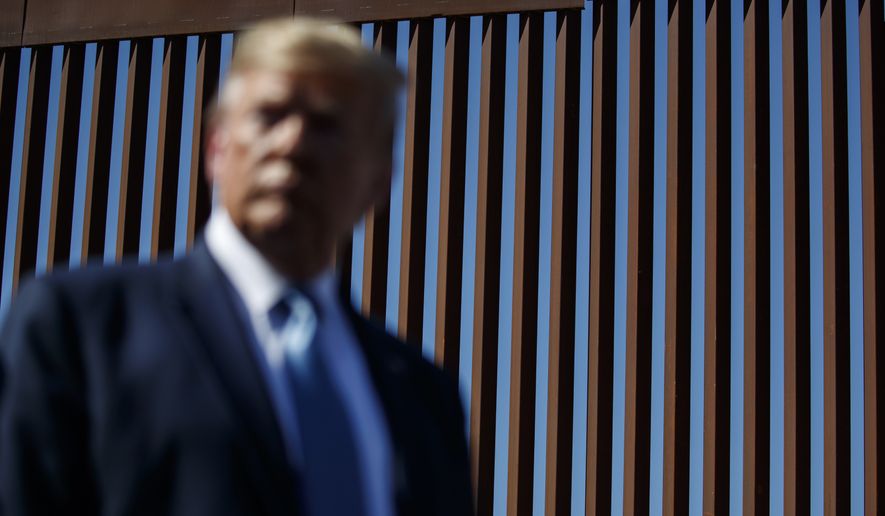The Supreme Court announced Monday that it will take up two key cases involving President Trump’s get-tough immigration policy, granting hearings on his border wall construction and his crackdown on bogus asylum claims.
Both cases go straight to the heart of presidential powers.
In shifting Pentagon money toward his border wall, Mr. Trump defied the will of Congress, and the justices will have to answer whether he also defied the letter of the law.
The asylum policy, officially known as the Migrant Protection Protocols but more commonly called “Remain in Mexico,” was crucial to stemming the surge last year of illegal immigrant families.
But the justices will have to decide whether Congress granted the president the power to push people back across the border to wait for their asylum cases to be processed in U.S. immigration courts.
“What’s at stake in these cases is whether our law allows the president to act quickly to respond to an asylum and illegal alien crisis, or whether he has to work through a deadlocked Congress to get anything done,” said Christopher Hajec, director of litigation at the Immigration Reform Law Institute, which wants stricter controls.
Lower courts ruled against Mr. Trump on both issues, but the Supreme Court allowed the policies to remain active as the cases advanced through the legal system.
The wall is perhaps the most visible of Mr. Trump’s 2016 campaign promises, and his opponents have been eager to shut down construction. As of last week, Customs and Border Protection and the Defense Department had erected more than 360 miles and were shooting for another 90 miles before the end of the year.
Most of the money for that construction is coming from Pentagon accounts Mr. Trump siphoned after Congress rebuffed his funding requests.
Lower courts ruled that Congress considered Mr. Trump’s requests but gave him less than he wanted, thus exercising Capitol Hill’s power of the purse. Mr. Trump, the courts ruled, trampled on that power by shifting money.
The government’s attorneys say what matters is that Congress didn’t expressly forbid the president from spending the money and in fact left that door open under the National Emergencies Act and the way the Pentagon’s drug interdiction accounts are structured.
“Trump’s attempts to sidestep Congress is a direct assault on the checks and balances that represent the bedrock of our democracy,” said Vicki B. Gaubeca, director of the Southern Border Communities Coalition, which with the Sierra Club filed a lawsuit to stop wall construction.
Legal questions aside, Homeland Security officials say, the wall is paying off in terms of security.
One 12-mile section of new wall freed up 150 agents to be deployed elsewhere — the equivalent of a $20 million return on investment each year, the Border Patrol’s chief told reporters last week. He said the wall has an expected life span of more than 30 years.
The asylum policy forced tens of thousands of Central Americans, who trekked north and crossed into the U.S. to lodge claims of asylum protection, to go back to Mexico to wait for their court dates.
That eliminated the incentive to make bogus asylum claims because it denied migrants the chance to live in the U.S. and disappear into the shadows while their cases were pending.
Border officials say MPP, along with deals the U.S. struck with Mexico, El Salvador, Honduras and Guatemala, solved last year’s record family migrant surge.
Lower courts ruled that the policy, announced by the Department of Homeland Security, exceeded the powers Congress granted to the president.
The American Civil Liberties Union, which is helping with the challenge, called MPP “illegal and depraved.”
“The courts have repeatedly ruled against it, and the Supreme Court should as well,” said ACLU attorney Judy Rabinovitz.
The Justice Department said returning migrants across the border to wait for their cases is “expressly authorized” by 1996 legislation passed by Congress and signed into law by President Clinton. The Trump administration was the first to use it.
Department spokesperson Alexa Vance said MPP has been “critical” in stemming the border surge.
“The department is pleased that the Supreme Court has granted our petition and will be reviewing this case,” she said.
The justices did not set a date for the arguments, and one or both cases could be moot by then, depending on the outcome of the Nov. 3 presidential election.
Democratic nominee Joseph R. Biden has vowed to roll back the MPP and halt border wall construction.
The wall case presents a special challenge, though.
Mr. Biden, who voted for hundreds of miles of fencing as a member of the Senate in 2006, hasn’t revealed whether he would pull down the wall that has been built under Mr. Trump — much of it replacing the wall Mr. Biden once supported.
The ACLU has said that if it prevails against Mr. Trump on the wall, it will ask that the miles constructed using the military money be pulled down.
Mr. Biden might then have to decide whether to defend the recently built sections of wall or accede to tearing down a project that Border Patrol agents say is paying real dividends.
The cases are the latest in a string of immigration tests Mr. Trump has foisted on the justices, including an attempt to end the Obama-era Deferred Action for Childhood Arrivals deportation amnesty for “Dreamers,” and banning most travel from countries he has identified as security risks.
His record at the high court has been mixed. The justices upheld his third version of the travel ban but rejected his DACA repeal. Although he had the power to end the program, he said, he needed to give better reasons to do so.
• Stephen Dinan can be reached at sdinan@washingtontimes.com.




Please read our comment policy before commenting.